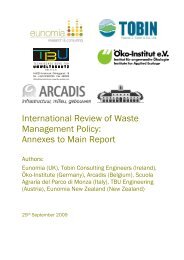Report of the Local Government Efficiency Review Group
Report of the Local Government Efficiency Review Group
Report of the Local Government Efficiency Review Group
You also want an ePaper? Increase the reach of your titles
YUMPU automatically turns print PDFs into web optimized ePapers that Google loves.
9.1 Role <strong>of</strong> Procurement<br />
9. Procurement<br />
9.1.1 The role <strong>of</strong> procurement has gained enhanced status in <strong>the</strong> past few years<br />
as a management tool to contain costs, achieve quality and improve <strong>the</strong><br />
effectiveness in purchasing <strong>the</strong> inputs necessary to provide public and<br />
private goods and services. The discipline and techniques applied in<br />
effective procurement are a key driver <strong>of</strong> efficiency and quality in delivering<br />
services to <strong>the</strong> public. Improvements in procurement are being developed<br />
at central level by <strong>the</strong> National Procurement Service. At local level, <strong>the</strong>re<br />
has been important progress but as with central government more can be<br />
done.<br />
9.2 <strong>Local</strong> <strong>Government</strong> Procurement<br />
9.2.1 Until relatively recently, local authorities used largely to procure on an<br />
individual basis and, as a result, <strong>the</strong>re were different and <strong>of</strong>ten inconsistent<br />
approaches to <strong>the</strong> tendering process. While adhering to EU Directives and<br />
national guidelines on procurement, for smaller items many local authorities<br />
used ‘annual quotation books’ whereby suppliers submitted a quotation list<br />
or catalogue <strong>of</strong> supplies and services at <strong>the</strong> start <strong>of</strong> <strong>the</strong> year, and buyers<br />
could directly select suppliers from this list as required throughout <strong>the</strong> year.<br />
9.2.2 Arising from <strong>the</strong> national e-Procurement strategy for <strong>the</strong> public sector in<br />
October 2001, <strong>the</strong> local government sector initiated a project to develop a<br />
sector-level e-Procurement strategy, published in 2003. The purpose <strong>of</strong> <strong>the</strong><br />
strategy was to provide a set <strong>of</strong> recommendations and an implementation<br />
plan to guide <strong>the</strong> development <strong>of</strong> procurement in <strong>the</strong> sector so that<br />
significant savings could be achieved by exploiting <strong>the</strong> opportunities for<br />
improving procurement performance. It was recognised that <strong>the</strong> existing<br />
approach was not always <strong>the</strong> most effective in terms <strong>of</strong> leveraging buying<br />
power and ensuring adequate competition in <strong>the</strong> supply market, and that a<br />
technology based system was required. The overall objectives <strong>of</strong> <strong>the</strong> <strong>Local</strong><br />
<strong>Government</strong> e-Procurement Strategy are set out in Appendix 8.<br />
9.2.3 The development <strong>of</strong> sectoral policies and procedures were needed to<br />
ensure that a more integrated approach was taken across <strong>the</strong> sector in this<br />
area. A key requirement to addressing this issue was <strong>the</strong> introduction <strong>of</strong> a<br />
modern financial management system and a unified coding system. Since<br />
2003 all local authorities have implemented new financial management<br />
systems based on accrual accounting. In all cases <strong>the</strong> FMS systems can<br />
support <strong>the</strong> raising <strong>of</strong> purchase orders through to payment <strong>of</strong> suppliers<br />
electronically. In general, manual activities such as raising purchase orders<br />
have been automated. In 2008, a standard coding system was introduced.<br />
100
















